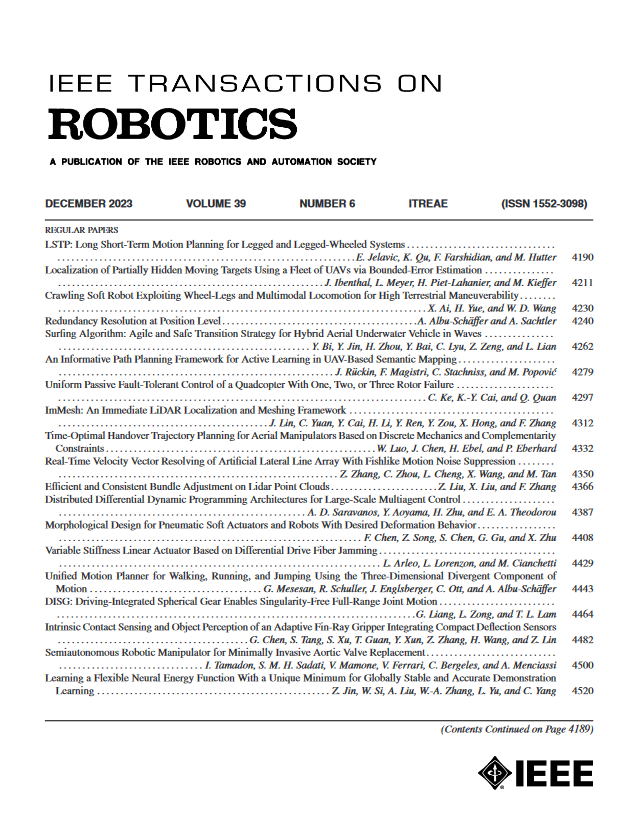SICNav:利用模型预测控制和双层优化实现安全互动的人群导航
IF 9.4
1区 计算机科学
Q1 ROBOTICS
引用次数: 0
摘要
机器人需要对人类的动作做出预测和反应,才能在人群中穿行而不发生碰撞。许多现有的方法将预测与规划分离,这没有考虑到机器人和人类运动之间的相互作用,可能导致机器人陷入困境。在本文中,我们提出了安全交互式人群导航(SICNav),这是一种模型预测控制(MPC)方法,它在闭环中共同解决机器人运动和预测人群运动的问题。我们对人群中的每个人进行建模,使其遵循最优互防碰撞(ORCA)方案,并将该模型作为约束嵌入机器人的局部规划器中,从而产生一个双层非线性MPC优化问题。我们使用Karush-Kuhn-Tucker (KKT)- re公式化将双层问题转换为单层问题,并使用非线性求解器进行优化。我们的MPC方法可以影响行人运动,同时明确满足单机器人多人环境中的安全约束。我们在两个模拟环境和真实机器人的室内实验中分析了SICNav的性能,以证明机器人的安全运动可以影响周围的人类。我们还在人类轨迹数据集上验证了ORCA的轨迹预测性能。本文章由计算机程序翻译,如有差异,请以英文原文为准。
SICNav: Safe and Interactive Crowd Navigation Using Model Predictive Control and Bilevel Optimization
Robots need to predict and react to human motions to navigate through a crowd without collisions. Many existing methods decouple prediction from planning, which does not account for the interaction between robot and human motions and can lead to the robot getting stuck. In this article, we propose safe and interactive crowd navigation (SICNav), a model predictive control (MPC) method that
jointly
solves for robot motion and predicted crowd motion in closed loop. We model each human in the crowd to be following an optimal reciprocal collision avoidance (ORCA) scheme and embed that model as a constraint in the robot's local planner, resulting in a bilevel nonlinear MPC optimization problem. We use a Karush–Kuhn–Tucker (KKT)-reformulation to cast the bilevel problem as a single level and use a nonlinear solver to optimize. Our MPC method can influence pedestrian motion while explicitly satisfying safety constraints in a single-robot multihuman environment. We analyze the performance of SICNav in two simulation environments and indoor experiments with a real robot to demonstrate safe robot motion that can influence the surrounding humans. We also validate the trajectory forecasting performance of ORCA on a human trajectory dataset.
求助全文
通过发布文献求助,成功后即可免费获取论文全文。
去求助
来源期刊

IEEE Transactions on Robotics
工程技术-机器人学
CiteScore
14.90
自引率
5.10%
发文量
259
审稿时长
6.0 months
期刊介绍:
The IEEE Transactions on Robotics (T-RO) is dedicated to publishing fundamental papers covering all facets of robotics, drawing on interdisciplinary approaches from computer science, control systems, electrical engineering, mathematics, mechanical engineering, and beyond. From industrial applications to service and personal assistants, surgical operations to space, underwater, and remote exploration, robots and intelligent machines play pivotal roles across various domains, including entertainment, safety, search and rescue, military applications, agriculture, and intelligent vehicles.
Special emphasis is placed on intelligent machines and systems designed for unstructured environments, where a significant portion of the environment remains unknown and beyond direct sensing or control.
 求助内容:
求助内容: 应助结果提醒方式:
应助结果提醒方式:


